Clinton needs Obama like few nominees have needed incumbents
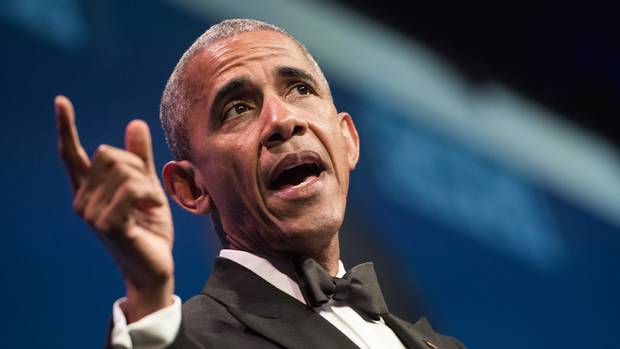
U.S. President Barack Obama speaks at a Washington gala on Sept. 15, 2016.
NICHOLAS KAMM/AFP/GETTY IMAGES
Was it really only eight years ago that Barack Obama was the bane of Hillary Clinton's existence – a cocky neophyte who had snatched away a nomination seemingly hers for the taking?
Now that she finally has her party's nod, Ms. Clinton needs all the help from her one-time rival she can get. In a terrible week for the Democratic nominee – her poll numbers falling as she was holed up sick after a near-collapse at a 9/11 memorial – the President's pinch-hitting in Philadelphia this week was a rare bright spot, as he delivered attack lines against Donald Trump with a deft touch she struggles to match.
As Ms. Clinton acknowledges, Mr. Obama is a much better campaigner than she is. But it is not just about charisma and cadence. It is also about credibility, and early onset nostalgia for his optimistic appeal as two unpopular candidates slug it out.
Mr. Obama's relatively strong approval ratings suggest he may be able to help with swing voters. But, more importantly, he still appears capable of lighting a fire under people – especially members of visible minorities and younger cohorts – who are likely to vote Democrat, but whom Ms. Clinton is struggling to persuade to vote at all.
Most nominees seeking a third term for their party are eager to set themselves apart. Ms. Clinton lacks that luxury; her campaign is signalling, with good reason, that Mr. Obama will be on the trail a lot more.
Even Trump's best weeks are incredibly ugly
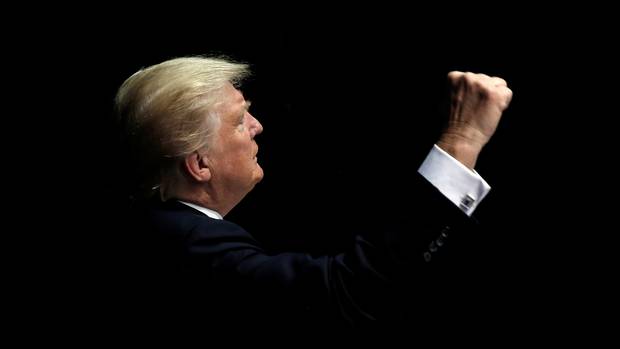
Republican presidential nominee Donald Trump gestures to supporters as he departs a campaign rally in Clive, Iowa, on Sept. 13, 2016.
MIKE SEGAR/REUTERS
Mr. Trump recently has come about as close as he ever will to fulfilling his promise to be "presidential" once he locked up the Republican nomination. As his campaign gained momentum this week, he occasionally showed something resembling restraint – mostly resisting the temptation to take shots at Ms. Clinton over her health problems, and managing to act relatively pleasant at the roll-out of a modest maternity-leave pitch aimed at showing his softer side.
But this was also a week in which Mr. Trump first refused to disavow the racist "birther" attempt to delegitimize his country's first black president, which he led for years, before falsely blaming Ms. Clinton for it. And he blatantly lied about how things went down at a church in Flint, Mich., whose pastor intervened to get him to tone down his rhetoric. He baselessly attacked the head of the Federal Reserve and spewed enough other falsehoods and exaggerations to fill just about this entire space.
Any one of those things might have been enough to sink a normal candidate. With Mr. Trump, his campaign team is earning plaudits for the discipline it has instilled. No candidate in history may have benefited more from low expectations.
Clinton's vicious circle of media mistrust threatens to devour her
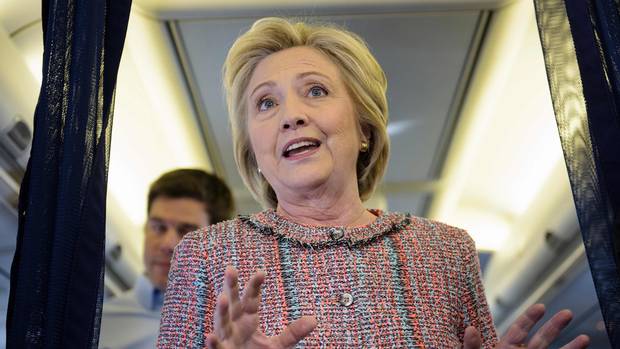
Democratic presidential nominee Hillary Clinton returns to campaigning after her bout with pneumonia at Westchester County Airport on Sept. 15, 2016, in White Plains, N.Y.
BRENDAN SMIALOWSKI/AFP/GETTY IMAGES
Maybe it was not possible, in a campaign in which her opponent has questioned her physical fitness for office, for Ms. Clinton to play her attempted push through a case of pneumonia for sympathy. But better she should have tried that than what she did instead.
By failing to tell reporters that she was sick, then sneaking out of the 9/11 event without explanation, then claiming it was heat-induced dehydration after she was caught on camera nearly keeling over, Ms. Clinton turned it into a drama all but designed to embolden conspiracy theorists.
In the process, she also demonstrated how dysfunctional her relationship with the media has become. Owing to her perception she and her husband are subject to an unfair level of scrutiny, her instinct is to share as little information as possible, which makes whatever she hides look worse when it eventually comes out, and makes the media more suspicious. And all concerned get to wonder how much worse it would be during four years in the White House.
You can call half your opponent's supporters 'deplorable' and be accused of not going far enough
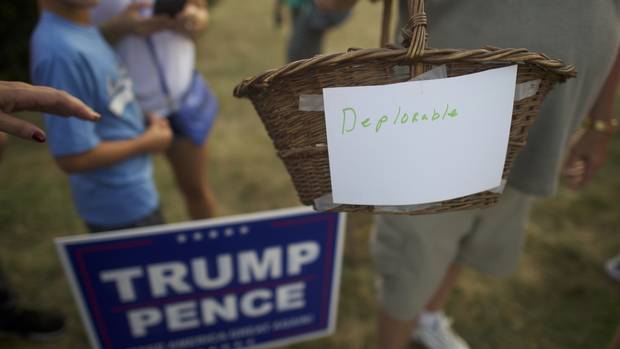
A Trump supporter holds a basket labeled “deplorable,” referencing Ms. Clinton’s comment about a “basket of deplorables,” at a campaign event in Aston, Pa., on Sept. 13, 2016.
MARK MAKELA/GETTY IMAGES
After saying last weekend that half of Mr. Trump's supporters fit into a "basket of deplorables," Ms. Clinton apologized, if only for the "half" part.
But to a good number of liberal journalists, she did not go far enough – just about anyone willing to vote for Mr. Trump's demagoguery fits into the same basket.Meanwhile, members of her campaign team have been saying they welcome the controversy, because it might help galvanize their supporters and anyone who is offended never would have voted for her anyway.
One might agree with either or both of those perspectives and still be shocked by the polarization they reflect – and that reasonable people are inclined to argue that a would-be president describing about 20 per cent of voters as "irredeemable" is a good thing.
Public figures need to stop putting their innermost thoughts in e-mails
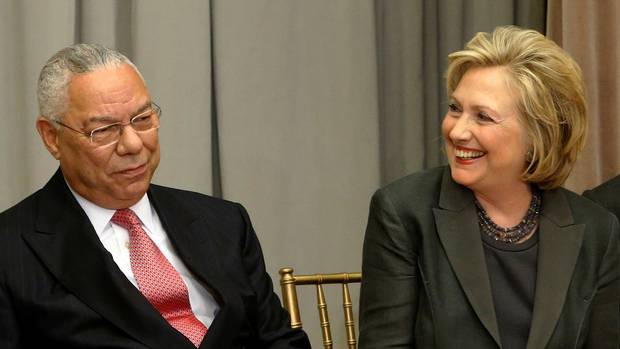
Former U.S. Secretaries of State Colin Powell and Hillary Clinton are shown on Sept. 3, 2014.
JONATHAN ERNST/REUTERS
For the second week in a row, Colin Powell made an unwanted campaign appearance courtesy of what he thought were private e-mail messages, in this case ones from the past two years that include critiques of Mr. Trump and Ms. Clinton.
The entertainment value of those hot takes from the seemingly mild-mannered Mr. Powell – including that Mr. Trump is a "national disgrace and an international pariah" who takes African-Americans "for idiots," and that he would "rather not have to vote for" his "friend" Ms. Clinton because "for good reason she comes across as sleazy" – is not inconsiderable.
But, unlike the 2009 note to Ms. Clinton in which he shared how he bypassed government servers while secretary of state, released last week at the behest of Democrats in Congress, we are seeing these only because Mr. Powell was hacked – which is to say, we really should not be seeing them.
Taking into account the hack of Democratic National Committee e-mails heading into that party's convention this summer, it is not overly dramatic to infer that this year's election is under cyberattack. And it is hopefully not victim-blaming to suggest a major player with something sensitive to say about the campaign might better just pick up the phone.
Follow Adam Radwanski on Twitter: @aradwanski
MORE FROM THE GLOBE AND MAIL
‘No Donald, you don’t’: Watch the highlights from Hillary Clinton’s convention speech
3:56

